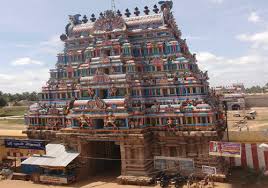Erukkathampuliyur (Rajendra Pattinam) Sri Swedaranyeswarar Temple, Cuddalore

Address
Erukkathampuliyur (Rajendra Pattinam) Sri Swedaranyeswarar Temple, Erukkathambuliyur, Rajendra Pattinam-. Cuddalore District – 608 703+ 91- 4143-243 533, 93606 37784
Diety
Thirukumarasamy ,Swedaranyeswarar Amman: Viramulaiyamman (apinnakucanayaki), apitakujanayaki,
Introduction
Thirukumaresar Temple (also called Erukathampuliyur temple or Rajendirapattinam temple) is a Hindu temple dedicated to the deity Shiva, located in Thirukoodalaiyathoor, a village in Cuddalore district in the South Indian state of Tamil Nadu. Shiva is worshipped as Thirukumaresar, and is represented by the lingam. His consort Parvati is depicted as Verumulai Amman. The presiding deity is revered in the 7th century Tamil Saiva canonical work, the Tevaram, written by Tamil saint poets known as the Nayanars and classified as Paadal Petra Sthalam. The temple is also the birthplace of Saiva saint Tirunilakanta Nayanar. The temple complex covers around half acre and entered through a five tiered gopuram, the main gateway. The temple has a number of shrines, with those of Thirukumaresar and his consorts Verumulai Amman, being the most prominent. All the shrines of the temple are enclosed in large concentric rectangular granite walls. Theertham (Holy water): Skanda Theertham, Neelorpala Theertham, Senkazhuneer Theertham Sthala Vriksham (Sacred Tree): Vellai Erukku Plant
Puranic Significance
As per Hindu legend, once Shiva was explaining the importance of Vedas and Agamas to Parvathi in Kailash. She was not paying attention and Shiva cursed her to born in earth in Bharathava community. Muruga, their son was angered that his father cursed Parvathi and argued with him. Shiva was further angered and he cursed Muruga also be born as a dumb boy in trader community. He was born as Rudrasarma in Madurai to an army lieutenant. The boy went to many Shiva temples for relief and when he finally came to the temple for worship, he got his speech.As per another legend, the celestial deities were enjoying the place and took the form of birds. Some hunters were trying to hunt them and by divine intervention, the hunters turned into Erukam trees whose wood is not useful. Thus the place came to be known as Erukathampuliyur.
Beliefs
Those suffering from speech impairment visit this temple and worship the lord here in order to seek relief. It is also believed that those seeking “santhana prapthi” (child boon) can pray to the lord here.
Special Features
This is one of the 276 Devara Paadal Petra Shiva Sthalams and 4th Shiva Sthalam in Nadu Naadu. Lord Shiva in this temple is a Swayambumurthi (self-manifested). This is the birth place of Saint Thiru Neelakanta Yazhpanar. The last consecration ceremony (Maha Kumbabishekam) took place on 02.09.1996. he temple has a three-tiered gateway tower and all the shrines of the temple are enclosed in concentric rectangular granite walls. The temple occupies an area of around 0.5 acres (0.20 ha). The central shrine houses the image of Thirukumaresar in the form of Lingam. The shrine of Veramulai Amman, the consort of Shiva facing West is located in the Mahamandapam leading to the sanctum. The central shrine is approached through the flagstaff and Mahamandapam, both which are located axial to the gateway. As in other Shiva temples in Tamil Nadu, the shrines of Vinayaka, Murugan, Navagraha, Chandikesa and Durga are located around the precinct of the main shrine. The temple tank is located opposite to the temple and is called Nilorpala Theertham. There is a shrine for Thiruneelakanta Nayanar and Sattanathar at an elevated plane. There are images of Thiruneelakanta Yazhpanar along with Mathanga Choodamaniyar. The shrines around the sanctum houses the images of Mahaganapathi, Viswanathar, Visalatchi, Murugar and Lakshmi.
Festivals
The temple priests perform the puja (rituals) during festivals and on a daily basis. The temple rituals are performed four times a day; Kalasanthi at 8:00 a.m., Uchikalam at 12:00 a.m., Sayarakshai at 6:00 p.m, and Arthajamam at 8:00 p.m.. Each ritual comprises four steps: abhisheka (sacred bath), alangaram (decoration), naivethanam (food offering) and deepa aradanai (waving of lamps) for Thirukumaresar and Verumulai Amman. There are weekly rituals like somavaram (Monday) and sukravaram (Friday), fortnightly rituals like pradosham, and monthly festivals like amavasai (new moon day), kiruthigai, pournami (full moon day) and sathurthi. Mahasivarathri during the Tamil month of Panguni (March – April) is the most important festivals of the temple.
Century/Period/Age
1000-2000 years old
Managed By
Hindu Religious and Charitable Endowments (HRCE)
Nearest Bus Station
Erukkathambuliyur
Nearest Railway Station
Virudhachalam
Nearest Airport
Puducherry




